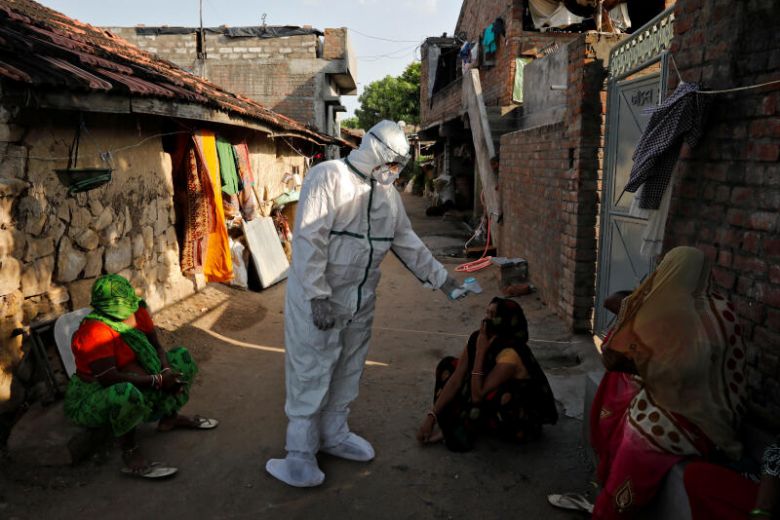Indian gov’t says it has no COVID-19 data, including doctors killed by the virus or firms forced to close

The government said it did not have the data for the number of healthcare workers who had been infected by Covid-19 and died. PHOTO: REUTERS
BANGALORE — Since India’s Parliament reopened on Sept 14 with social distancing norms, after five months of coronavirus-induced restrictions, its sessions have been anything but smooth sailing.
Howls of protest from opposition parties greeted the government’s cancellation of Question Hour for parliamentarians to verbally ask questions of ministers.
But few anticipated data shortages and absence of meaningful debate on crucial issues.
When asked important questions on the pandemic and the nationwide lockdown imposed from March 24, various ministries simply said they did not have the information.
On the opening day of the new Parliament session, MPs from Tamil Nadu and Maharashtra asked the labor ministry for details of migrant workers who had returned home during the lockdown, those who had died during their journeys, and the compensation received by their families.
Article continues after this advertisementThe ministry said nearly 10.5 million workers had left for home. But on the number that died, it said, “No such data was maintained” and so, the question of compensation “does not arise”.
Article continues after this advertisementThe lockdown had prompted millions of migrant workers to flee the cities, often on foot, for their homes in the countryside. The magazine India Today had documented details of 238 migrant workers who died while trying to reach home.
The government also said it had no data about job losses among migrant workers during the pandemic.
Likewise, it had no information about police personnel who had died from Covid-19.
When asked for the number of healthcare workers who had been infected by and died from Covid-19, again, it said it did not have the data. Instead it offered information about the families of 155 healthcare workers, including 64 doctors, who had sought life insurance payouts under a government program.
The day after the government’s reply, an infuriated Indian Medical Association published a list of 382 doctors who had died of Covid-19, and demanded they “be acknowledged and treated as martyrs”.
The association, which represents Indian doctors, added that a government which does not maintain data about healthcare workers “loses the moral authority” to administer laws to deal with the pandemic.
“To feign that this information does not merit the attention of the nation is abominable,” it wrote.
Last Saturday (Sept 19), various ministers claimed they had no data on crucial questions.
The education ministry, when asked, said it does not keep data of the number of student suicides during the lockdown.
Similarly, the ministry of micro, small and medium enterprises said it had no data on the number of business establishments that shut down because of economic distress since March, or even on the number that had shut down since 2014 when the government first came into power.
When the labour ministry was asked for details of suicides by migrant workers, it said it was still collecting the information from state governments.
Then on Sunday, the government said it did not keep centralized data on the number of plasma banks treating Covid-19 patients.
“It is a new method of thwarting the right to information,” said Mr Nikhil Dey, a transparency activist and co-founder of the Mazdoor Kisan Shakti Sangathan whose two-decade-long campaign had led India to pass a law in 2005 granting citizens the right to information.
“If you don’t collect inconvenient data, you don’t need to provide information that might lead to accountability. Not to citizens and not to MPs,” he added.
Amid the claims of having no data, the Parliament sat on Sunday and passed three controversial laws on agriculture reforms by voice vote, forcing MPs to shout their “ayes” and “nays” amid noisy arguments.
Many opposition leaders, calling this undemocratic, had asked for electronic voting as is normally done on such robustly debated policies.
Attendance at the various sittings was also lower than usual.
The reasons include 200 of the 785 MPs who are older than 65 being advised not to attend the sessions to reduce their risks of getting infected, socially distanced seating, the suspension of eight members for “unruly behavior” on Sunday as well as many boycotting the sessions in support of the suspended leaders.
But on Monday, the upper house of Parliament swiftly passed seven key legislations in 3½ hours, with little debate that involved only the allies of the ruling party.
The current parliamentary session ends on Oct 1, marking the last sitting for this year. But the Cabinet is mulling over ending the session by the middle of next week, in view of the rising number of MPs who have tested positive for Covid-19.
For more news about the novel coronavirus click here.
What you need to know about Coronavirus.
For more information on COVID-19, call the DOH Hotline: (02) 86517800 local 1149/1150.
The Inquirer Foundation supports our healthcare frontliners and is still accepting cash donations to be deposited at Banco de Oro (BDO) current account #007960018860 or donate through PayMaya using this link.